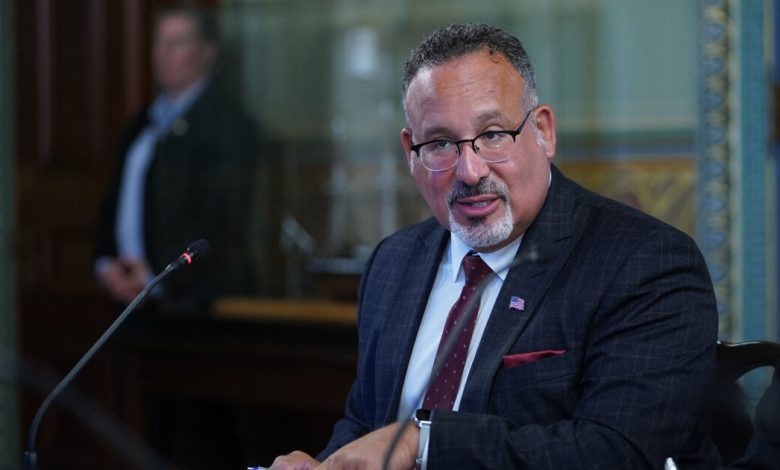College Rankings Are ‘a Joke,’ Education Secretary Says

[ad_1]
Education Secretary Miguel A. Cardona called college rankings “a joke,” and took aim at selective colleges’ obsession with them, as he made a broader push on Thursday for closing stubborn equity gaps in the nation’s college-graduation rates.
“Many institutions spend enormous time and money chasing rankings they feel carry prestige, but in truth do little more than Xerox privilege,” Cardona said, attributing the phrase to the president of a historically Black college.
There’s a “whole science behind climbing up the rankings” that leads to misplaced priorities, Cardona said. The best-resourced colleges are playing a prestige game instead of centering “measures that truly count,” he said. “That system of ranking is a joke.”
Cardona specifically criticized the use of standardized-test scores, peer-assessment surveys, and alumni donations as key metrics, as is the case in the U.S. News & World Report rankings.
“You compete for the most affluent students by luring them with generous aid, because the most well-prepared students have the best SAT scores and graduate on time. You seek favor from your peers, from other elite schools, with expensive dinners and lavish events because their opinions carry clout in surveys,” he said. “And then you invest in the most amazing campus experiences that money can buy because the more graduates who become donors, the more points you score.”
Cardona called for a “culture change” in higher ed so that institutions would value inclusivity, use data to help students before they dropped out, and create more-accessible pathways for adult learners, rural students, and first-generation students.
“Let’s confer prestige on colleges’ breaking cycles of poverty. Let’s raise the profiles of institutions delivering real upward mobility, like all of you,” Cardona told attendees, echoing an essay he wrote for The Chronicle on Thursday. “Let’s turn the universities that walk the walk on equity into household names.”
The secretary spoke at a summit focused on college completion, where officials from the California Community College system, Arizona State University, Davidson College, and some 40 other institutions discussed how to increase attainment rates and what students from marginalized backgrounds need to succeed.
The Biden administration deemed college completion a priority last year, with the president calling for a $62-billion investment in increasing higher-education attainment over 10 years. A proposal introduced last year in the U.S. House of Representatives called for spending $9 billion over seven years. The money would create a “college-completion fund,” with institutions competing for grants to support programs and efforts to increase student success.
Spending bills for the 2023 fiscal year announced last month by the Senate Appropriations Committee included $75 million for the college-completion fund. On Thursday the Education Department announced that $5 million in grants would be made available this fall for HBCUs, tribal colleges, and minority-serving institutions.
Here are three other themes Cardona highlighted during Thursday’s event:
Colleges must move urgently to better serve underrepresented students.
As college leaders head into the fall semester, Cardona said, they need to “maintain the level of urgency” from the last two pandemic-disrupted years to “change what we know needs changing.”
“My fear is that we go backwards with regards to our urgency, that we go back to the systems that serve some students better than others,” Cardona said. “The system was disrupted for us. Let’s not build it back the way it was that didn’t work.”
While race and diversity have become divisive topics in some states, campus leaders shouldn’t back down.
For some colleges, even having conversations about change — especially when race and diversity are involved — has become a challenge. Cardona told college leaders to rely on data to tell the story.
“If we look at the data, and we see that some children are achieving more than other children, it’s incumbent upon us to make sure that all children can achieve,” Cardona said. “The issue of helping children succeed — that doesn’t have party lines.”
To help students with basic needs, colleges should continue to embrace partnerships.
To close equity gaps, colleges should focus on fulfilling students’ basic needs, Cardona said. Many students face housing and food insecurity as well as mental-health challenges. “If you think college completion doesn’t involve that, you’re missing the point,” Cardona said.
Partnerships across institutions and within communities became the norm during the pandemic. That approach should continue, Cardona said. “You don’t have to do it all. You don’t have to be the mental-health expert,” he said. “Collaborate with the village around you.”
Colleges can’t just assign “technical Band-Aids to adaptive problems,” Cardona said. Instead, higher ed needs to shift its mind-set to one where “we’re looking out for the whole child,” Cardona said. “We’re meeting them where they are.”
[ad_2]
Source link






